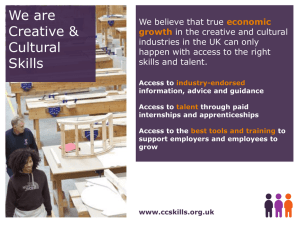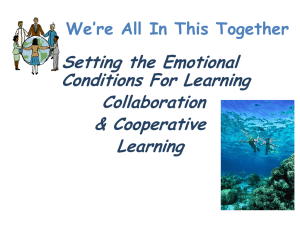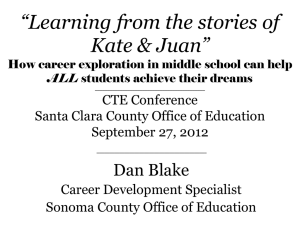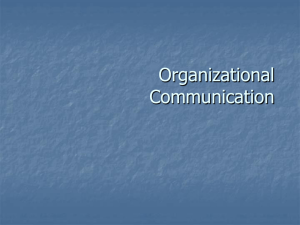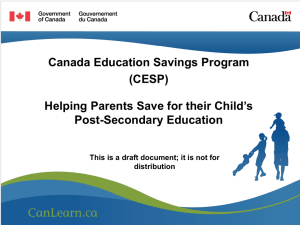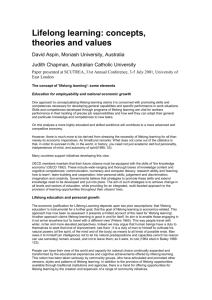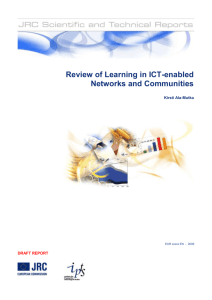COURSE - Buncombe County Schools
advertisement
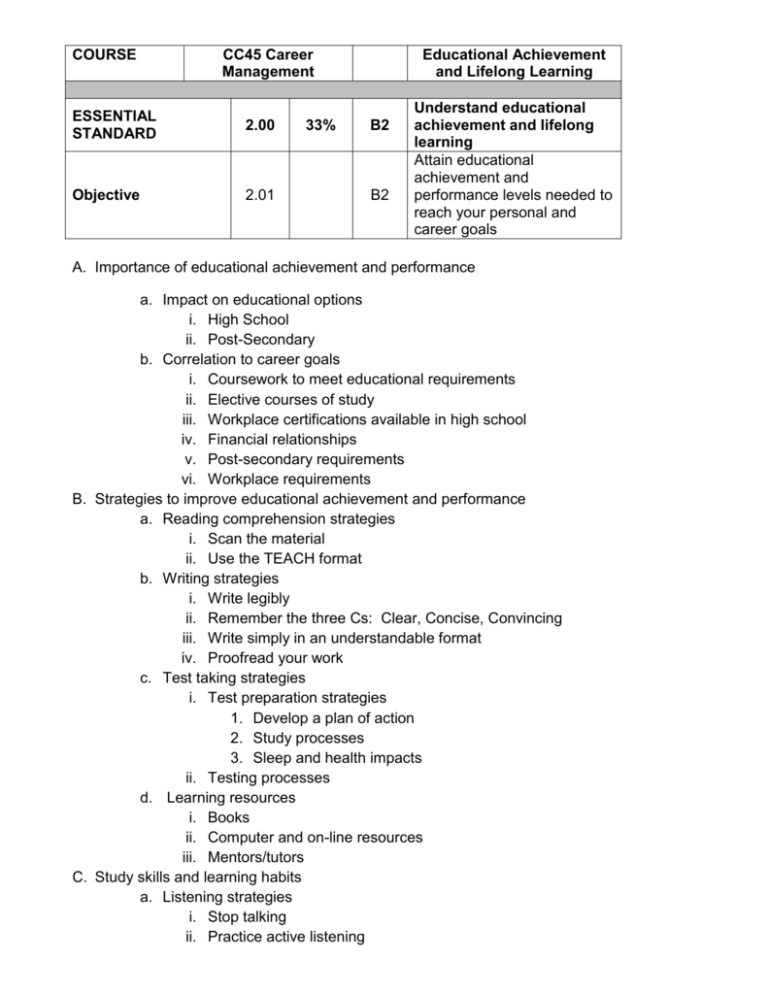
COURSE CC45 Career Management ESSENTIAL STANDARD 2.00 Objective 2.01 33% Educational Achievement and Lifelong Learning B2 B2 Understand educational achievement and lifelong learning Attain educational achievement and performance levels needed to reach your personal and career goals A. Importance of educational achievement and performance a. Impact on educational options i. High School ii. Post-Secondary b. Correlation to career goals i. Coursework to meet educational requirements ii. Elective courses of study iii. Workplace certifications available in high school iv. Financial relationships v. Post-secondary requirements vi. Workplace requirements B. Strategies to improve educational achievement and performance a. Reading comprehension strategies i. Scan the material ii. Use the TEACH format b. Writing strategies i. Write legibly ii. Remember the three Cs: Clear, Concise, Convincing iii. Write simply in an understandable format iv. Proofread your work c. Test taking strategies i. Test preparation strategies 1. Develop a plan of action 2. Study processes 3. Sleep and health impacts ii. Testing processes d. Learning resources i. Books ii. Computer and on-line resources iii. Mentors/tutors C. Study skills and learning habits a. Listening strategies i. Stop talking ii. Practice active listening D. E. F. G. iii. Focus on presenter iv. Repeat messages to determine understanding b. Concentration strategies i. Avoid distraction/stay focused ii. Concentrate on the task iii. Study effectively iv. Take breaks c. Memory strategies i. Employ listening and concentration skills ii. Repeat verbally or in writing iii. Associate material with the familiar (analogies) iv. Employ mnemonic devices d. Note-taking strategies i. Listen carefully ii. Write legibly iii. Follow the presenter iv. Organize notes v. Review notes Utilization of learning style information to improve educational achievement and attainment a. Personal learning style to improve educational achievement b. Working with others to increase educational understanding Planning improves educational achievement and performance a. Review educational planning processes i. 4-Year Plans ii. Courses of Study iii. Career Clusters iv. CTE concentration requirements v. Dual enrollment opportunities vi. AP/IB courses vii. Work-based learning options 1. Cooperative education 2. Internships 3. Apprenticeships 4. School-based enterprises viii. Extra-curricular activities (CTSOs) b. Develop personal learning plan to improve educational achievement i. Assess learning processes ii. Identify strategic goals reflecting education and career expectations Personal attitudes and behaviors impact educational achievement and performance a. Self-observation b. Knowledge of oneself c. Accept who you are d. Set goals for formal and informal learning experiences Educational achievement and performance impacts workplace options a. Work options during high school i. Impact of educational achievement and performance 1. Course performance 2. SAT/ACT 3. WorkKeys 4. Certifications 5. Other assessments ii. Strategies for success b. Work during post-secondary education i. Impact of educational achievement and performance ii. Strategies for success c. Military options i. Course grades and GPA ii. ASVAB iii. Strategies for success d. Transition into the workplace i. Transcript impact ii. Certifications iii. Work-based learning experiences iv. Strategies for success H. Ability to acquire and use information affects educational achievement and performance a. Workplace competencies i. Resources ii. Interpersonal skills iii. Information iv. Systems v. Technology b. Foundation skills i. Basic skills 1. Reading 2. Writing 3. Math 4. Speaking 5. Listening ii. Thinking skills 1. Creativity 2. Decision-making 3. Problem solving 4. Reasoning iii. Personal qualities COURSE CC45 Career Management ESSENTIAL STANDARD 2.00 Objective 2.02 33% Educational Achievement and Lifelong Learning B2 B2 Understand educational achievement and lifelong learning Participate in ongoing, lifelong learning experiences to enhance your ability to function effectively in a diverse and changing economy A. Lifelong and independent learning affects identity and increases the ability to function effectively in a diverse and changing economy a. Lifelong learning and impact on identify i. Middle School ii. High School iii. Post-Secondary iv. Adult b. Independent learning processes i. On-line ii. Project-based iii. Independent study iv. Self-instruction v. Others c. Identity and ability to function in diverse and changing economy affected by learning i. Motivation to learn ii. Adaptation of skills to economic demands iii. Understanding diverse economies iv. Personal and professional growth B. Knowledge and skills are necessary for transition from one learning level to the next a. Middle school to high school i. Academic requirements and expectations ii. Courses of study iii. Graduation requirements b. High school to post-secondary i. Academic requirements and expectations ii. Course and major options iii. Correlation between academic performance and financial opportunities iv. Impact of informal learning and volunteer experiences c. Lifelong learning i. Work-based ii. Self-directed iii. Formal or informal C. Prepare to participate in ongoing learning experiences a. Identify current learning experiences i. Academic ii. CTE Electives iii. Non-CTE Electives iv. Certifications and Credentials v. On-the-job training vi. Dual enrollment vii. Internships viii. Apprenticeships ix. Club/Organizational learning experiences x. Hobbies/Sports/Arts xi. Others b. Project continuation of learning experiences i. Academic ii. CTE Electives iii. Non-CTE Electives iv. On-the-job training v. Dual enrollment vi. Internships vii. Apprenticeships viii. Certifications and Credentials ix. Club/Organizational learning experiences x. Hobbies/Sports/Arts xi. Others c. Identify future learning experiences i. Two Year Colleges ii. Four Year Colleges iii. Technical Schools iv. Certification Programs v. Credentials attainment vi. Apprenticeships vii. Internships viii. Club/Organizational learning experiences ix. Hobbies/Sports/Arts x. Military xi. On-line courses xii. Others D. Demonstrate participation in specific education/training programs to help you function effectively in a diverse and changing economy a. Identify personal impact of education/training programs in a diverse economy i. Local economy ii. Regional economy iii. State economy iv. National economy v. Global economy b. Identify personal impact of education/training programs in a changing economy i. Local economy ii. Regional economy iii. State economy iv. National economy v. Global economy E. Demonstrate participation in informal learning experiences a. Identify current informal learning experiences i. At home ii. At work iii. Through interaction with others b. Document informal learning experiences i. At home ii. At work iii. Through interaction with others
